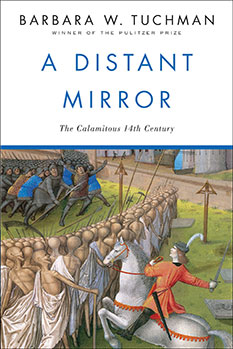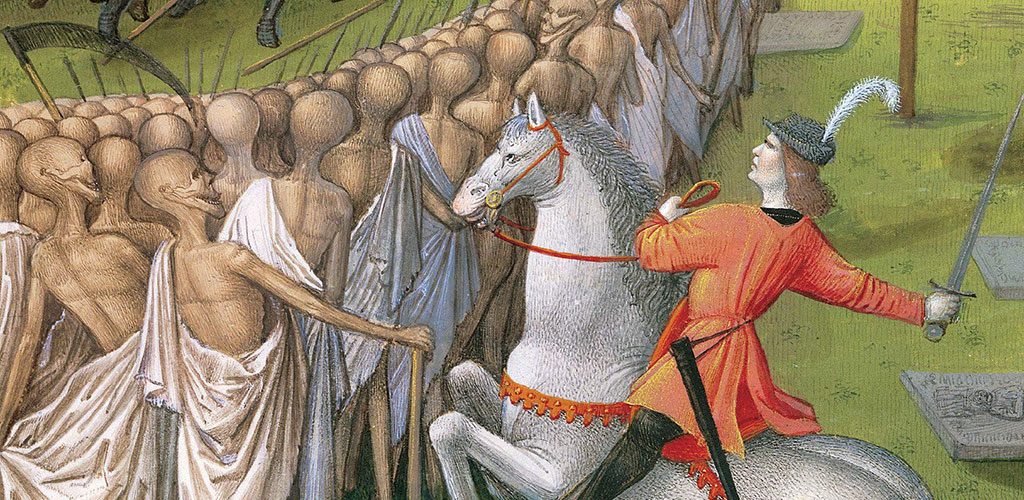
This is one of those should-have-read-it-years-ago books that I have finally pulled off the shelf. I first heard of it in the second year of an English degree when I took a course on Chaucer. Geoffrey Chaucer gets an occasional mention here, but he’s only a bit player in Tuchman’s pageant. The book is useful in understanding Chaucer, not for anything it explicitly says about Chaucer, but for what it says about the culture that produced the man—the importance of the Romance of the Rose, Boccaccio, courtly love, and the chivalric code. All of these inform The Canterbury Tales.
I next heard of the book 20 years later when I was taking a course on the history of the Reformation. Without an understanding of conditions in late medieval Europe—the Bubonic Plague, the Hundred Years War, the Peasant’s Revolt, abuses of the Church and rise of anti-clericalism—it’s hard to understand the emergence of people like Martin Luther and John Calvin on the religious front, and men like Galileo and Copernicus on the scientific front, all challenging the authority of the Church as the gatekeeper of knowledge.
Yes, I should have read this book years ago but I understand my resistance: the book is bloody long! When I was a student, I didn’t have great stretches of time to read sprawling historical accounts. Ironic, then, that it should be a pandemic that provides both the motivation and the time for this. I decided to read the book because I thought it might provide useful insights into the experience of a pandemic. I’m after the long view. Thanks to near-instantaneous media communication, our world is awash in short-view reportage. Trump-incited thugs have overrun the Capitol. The Vice President refuses to do the President’s bidding and has withdrawn to a bunker for fear of reprisal. The House reconvenes and confirms the Electoral College vote; Biden is the next president. Now, there’s a movement afoot to bring about a second impeachment. And we can watch it almost as it unfolds in real time. Yet, for all its immediacy, there is one question which none of the instant reportage can answer: will any of this have lasting consequences? Will we remember any of this 50 or 100 years from now?
In the 14th century, the Bubonic Plague was a destabilizing event. It is impossible to say much about its prevalence, fresh outbreaks, 2nd and 3rd waves, the kinds of statistics a modern epidemiologist would try to gather. Mortality rates are obscured by the fact the Western Europe was embroiled in perpetual warfare. When the English and French weren’t fighting each other, they were raising armies for Crusades. Medieval economies could not support this and so, to finance it, they resorted to devaluation of currency by restamping coin with adulterated metals (the medieval equivalent of 20th century money printing and 21st century quantitative easing) or more frequently by granting armies the right to self-finance through pillage. Either way, those who suffered most from these practices were the poor. Plus ça change! It is impossible to say what proportion of depopulation was a result of plague or of war but the net result was that, in France, population fell by at least 50%. Similar figures would be true of England, Spain, Italy and Bavaria. This meant that well into the 15th century, the countryside was dotted with abandoned castles and monasteries, roads were overgrown, and farmland was reclaimed by surrounding forests. In today’s parlance, we would say that infrastructure was crumbling and central governance was too ineffectual to do anything about it.
But the horrid suffering and the miserable living conditions of ordinary people would not have happened without an enabling ideology. On the secular side, we have the notions of courtly love and the chivalric code. In practical terms, these legitimized a mode of comportment and a lifestyle that could only be sustained by exploiting the poor and producing egregious disparities of wealth. Those knights who adhered to the ideals (most didn’t) only did so within their closely circumscribed world; beyond that world, they treated people brutally. They were monsters. Despite the cult of courtly love and the claims it made for the human heart, virtually all court marriages were strategic alliances that incidentally facilitated the rape of prepubescent girls. The so-called great houses of Europe were so in-bred that insanity and stupidity were inevitable. On the sacred side, life was no less grasping, with the monasteries, churches and the pope(s) (at that time, there were two popes) all functioning as power brokers. In effect, the life divine was a workaround for those shut out by the rule of primogeniture. The 2nd, 3rd, and 4th born of noble houses could still have a crack at the good life, including limitless sex and booze, if they opted for the priesthood.
One of the reasons we read history is to draw comparisons to our own time. It ameliorates our sense of astonishment at the turn of events today when we realize, despite repeated claims about living in unprecedented times, that our times do indeed have precedents. Things never stagnate into a perpetual horror; we find ways forward; we stumble and we pick ourselves up. So what does the 14th century have to teach us about the 21st?
In absolute terms, the Bubonic Plague was far worse than Covid-19. The same can be said for the end of the 15th century with the impact of smallpox on the Americas and of syphilis on Western Europe, and for the beginning of the 20th century with the impact of the Spanish flu across the globe. On a per capita basis, the impact of Covid-19 is minuscule by comparison. And because it overwhelmingly takes people after child-bearing years, it will have no demographic impact. One of the reasons for the relatively low impact of Covid-19 is the near universal deployment of public health agencies. The WHO provides global coordination. The virus was identified almost immediately and useful information was disseminated to national and local public health agencies which were then able to implement prophylactic measures like mask-wearing, social distancing, and lockdowns. We complain about anti-maskers and conspiracy lunatics and politicians whose response strikes us as too slow. However, in part, these things play to what Schwab & Malleret identify as the bias of availability. Media makes available to us images of people protesting mask usage and we exaggerate the prevalence of this behaviour. The fact is: public health measures are working. They are not optimal, but something is better than nothing, and the long view of history demonstrates that our something is significantly better than the nothing our ancestors knew.
Another and startling observation which I have not seen discussed elsewhere is the fact that this appears to be the first time in recorded history that a pandemic has not arisen in connection with or been exacerbated by a large-scale military mobilization. Again, thanks to the bias of availability, media images persuade us that armed conflict proliferates across the face of the globe, but this is not the case. That isn’t to say there aren’t areas where a military presence contributes to the spread of the SARS-CoV-2 virus. But when compared to earlier outbreaks, like the plague of Athens during the Peloponnesian War, the Bubonic Plague during the Hundred Years War, and the Spanish flu during WWI, the association between Covid-19 and military action is statistically negligible.
This is a good news/bad news observation. On the one hand, it reinforces the Steven Pinker thesis that, collectively, we are becoming a more peaceful species. On the other hand, we still have to account for the rise of the current pandemic and then do something about it. It would appear that the aetiology of the SARS-CoV-2 is tied to modern methods of food management. And its spread is tied to modern mobility, namely air travel. In other words, if we want to address the possibility of another pandemic, then we have to address modernity itself, not just its outward manifestations like factory farming and the tourist industry, but the very idea of modernity. This is our enabling ideology, and as with that of an earlier age, it produces unintended consequences that the world cannot tolerate. The lesson we learn from the 14th century is that the world does not tolerate insupportable ideas. Modernity is one such idea and, although it may take generations, it will pass away.
